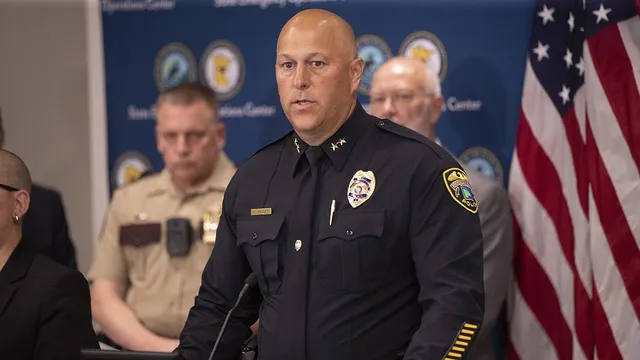
Vance Boelter charged with murder of Minnesota lawmakers amid political violence
2025-06-18 11:27- Vance Boelter opened fire at the Brooklyn Park home of state Rep. Melissa Hortman early on June 15, 2025.
- Multiple weapons and a list of Democrat officials were found in Boelter’s vehicle.
- This politically motivated attack raised concerns about the safety of elected officials in Minnesota.
Express your sentiment!
Insights
On June 15, 2025, in the United States, two shootings targeting lawmakers occurred, resulting in the deaths of Minnesota state Representative Melissa Hortman and her husband, Mark, and injuries to Senator John Hoffman and his wife, Yvette. The suspect, 57-year-old Vance Boelter, was arrested after a manhunt that lasted over 36 hours. Authorities discovered a vehicle disguised as a police SUV at Hortman’s residence, which contained weapons and a list of potential targets, including various Democrat officials. This targeted violence was deemed politically motivated, spurred on by the suspect's apparent grievances against Democratic politicians and advocates for abortion rights. The investigations led to confirmation of the suspect's background in security and military training, raising concerns regarding his premeditated actions. The incident has prompted Minnesota officials to emphasize the need for safety among politicians amid fears of potential copycat violence in the future. Governor Tim Walz condemned the shootings, highlighting the troubling trend of political confrontation escalating to gun violence, and vowed that justice would be pursued rigorously through the legal system to ensure accountability for the acts committed.
Contexts
The history of violence against politicians in the United States is a complex and troubling narrative that spans centuries, reflecting the turbulent dynamics of the nation's socio-political environment. Violence against political figures has occurred in various forms, including assassination, attempted murder, and threats, often driven by extremist ideologies, political disagreements, or personal vendettas. The most notable incidents include the assassinations of President Abraham Lincoln in 1865, Senator Robert F. Kennedy in 1968, and Dr. Martin Luther King Jr. in 1968, each significantly impacting the political landscape and public perception of safety among political leaders. These acts not only targeted individual leaders but also sent shockwaves through the broader society, prompting a reevaluation of security measures for public officials and raising awareness about the potential consequences of political unrest and division. Throughout the 20th century, the United States witnessed a series of violent incidents against politicians, reflecting the growing polarization of American politics. In addition to the assassinations, other attack attempts included the shooting of President Ronald Reagan in 1981, a stark reminder of the risks faced by political figures, even when engaging with the public. The motivations behind these acts often stem from deep-seated frustrations with government policies, perceived injustices, or radical ideologies. The surge in domestic extremism in recent years has further heightened concerns regarding the safety of politicians, evident in the threats faced by members of Congress and local officials, particularly during divisive election cycles or following significant legislative actions. The emergence of social media has also transformed the landscape of political violence, serving as both a platform for mobilization and a source of threats. Politicians now face harassment and intimidation in digital spaces, which can lead to real-world consequences. The Capitol Riot of January 6, 2021, serves as a pivotal example, highlighting how misinformation and incendiary rhetoric can incite violence against elected officials and disrupt the democratic process. Following such events, there has been a renewed focus on the responsibility of political leaders and social media platforms in fostering a culture of political respect and safety. In responding to the history of violence against politicians, society must grapple with the underlying issues that fuel such actions. Addressing political polarization, promoting civil discourse, and enforcing laws against threats are pivotal steps in mitigating risks to public officials. As the political climate continues to evolve, understanding the historical context of violence against politicians is crucial for creating effective strategies to protect elected leaders and maintain the integrity of democratic institutions.